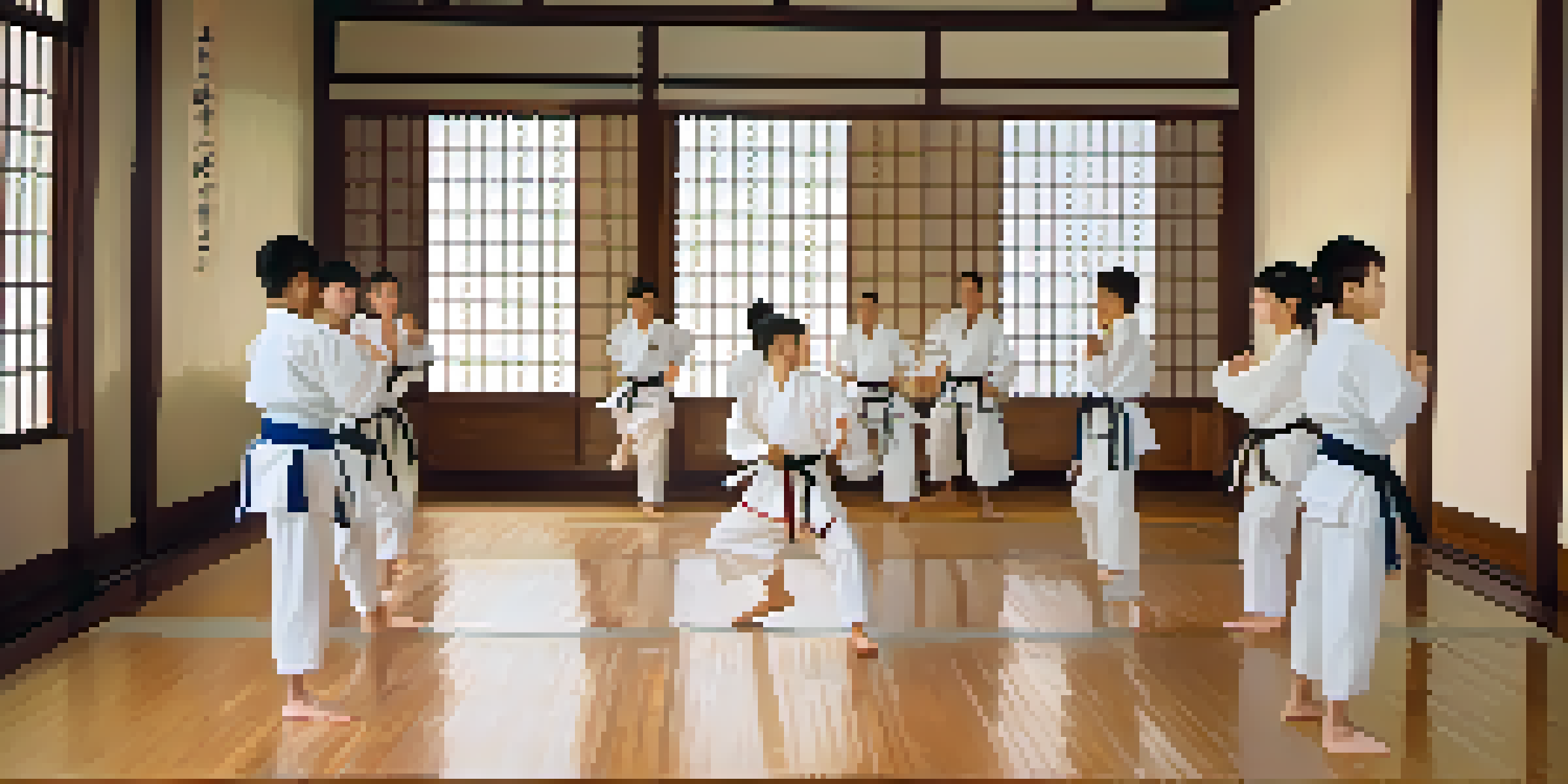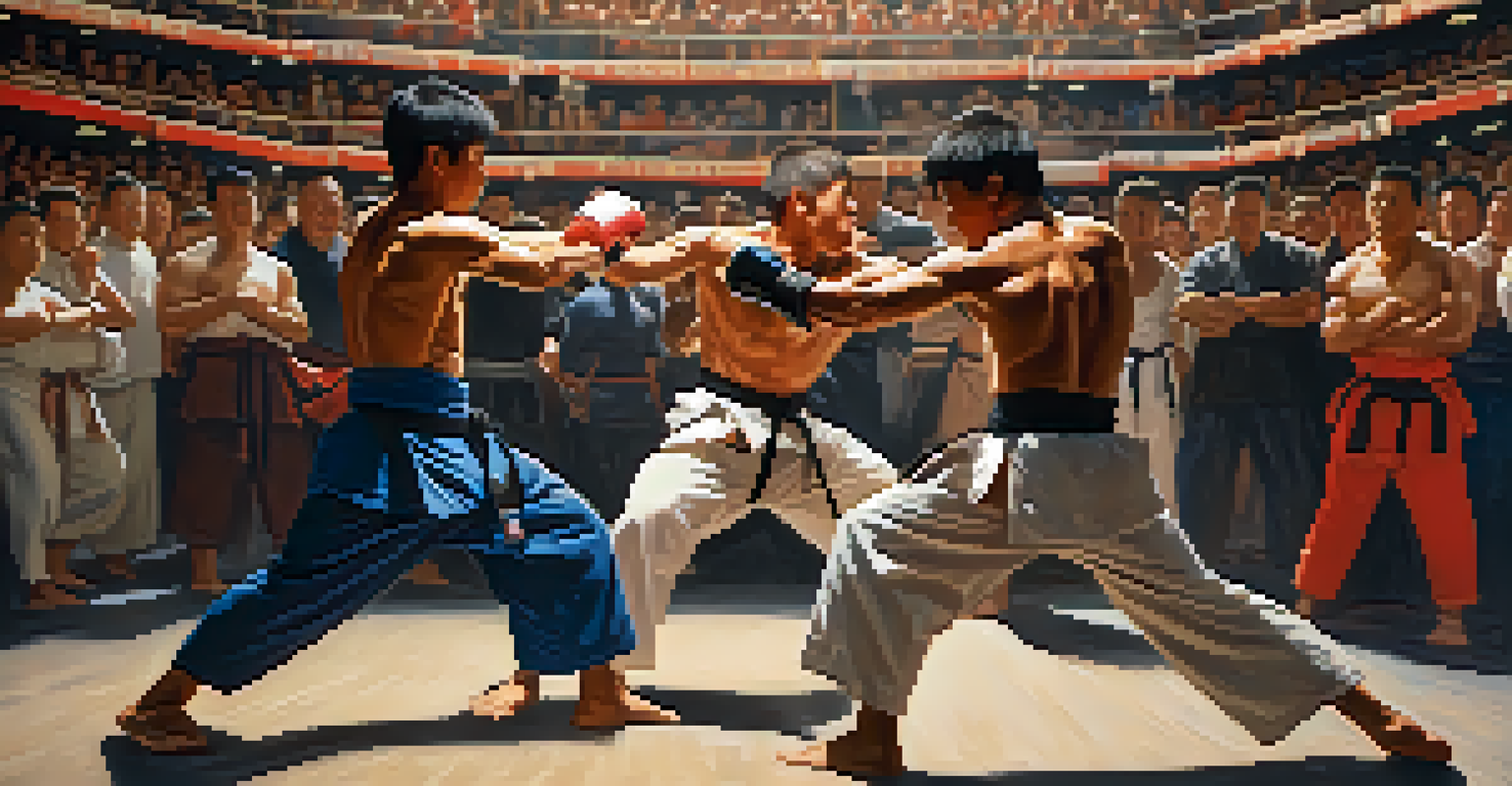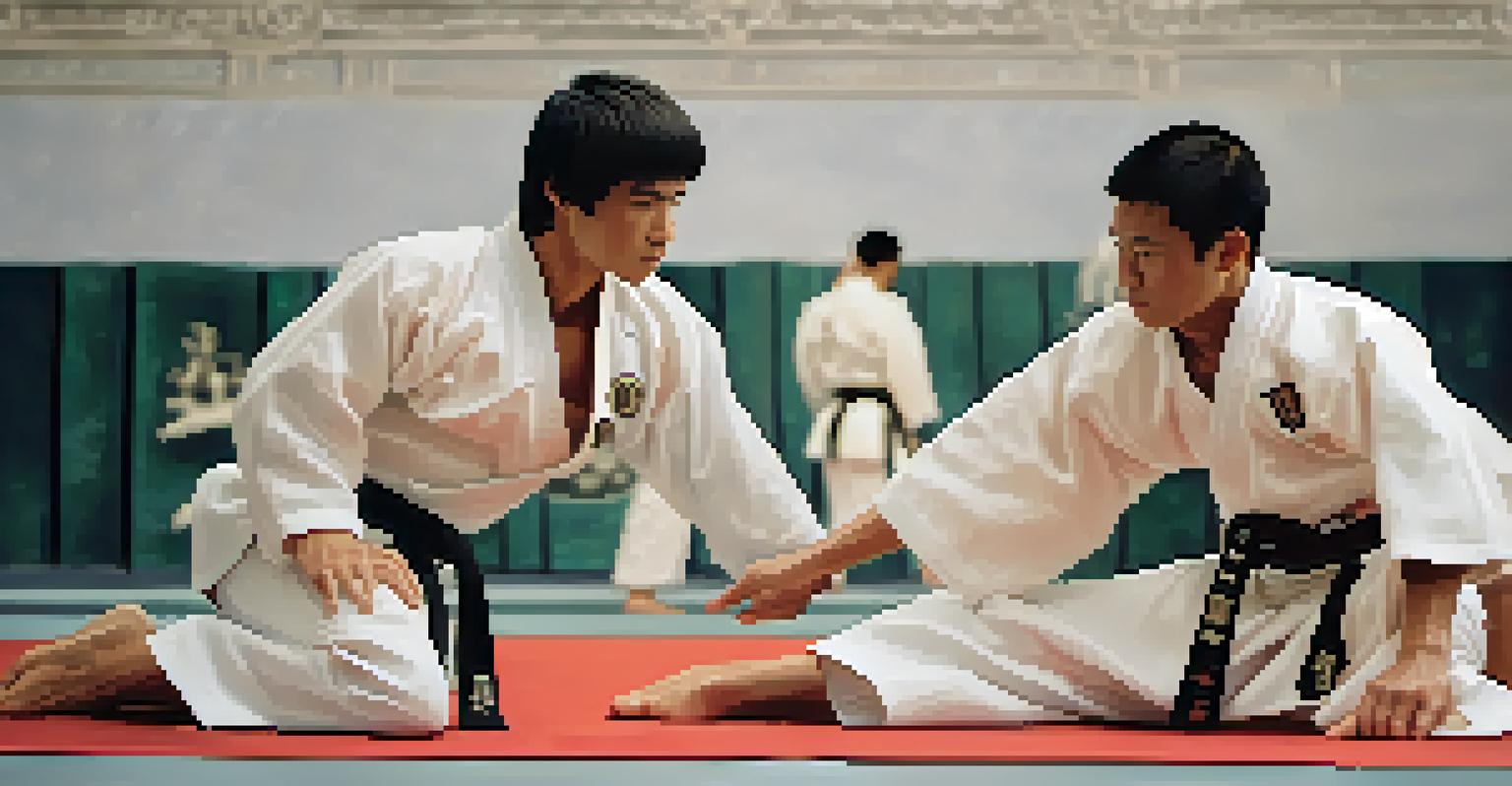Enhancing Communication Skills Through Martial Arts Training

Understanding the Connection Between Martial Arts and Communication
Martial arts is often seen purely as a physical discipline, but it also offers profound lessons in communication. When practicing, students must convey intentions clearly to their instructors and peers, fostering a deeper understanding of verbal and non-verbal cues. This creates an environment where effective dialogue is not just encouraged, but necessary for growth and safety.
The more you know yourself, the more you understand others.
For instance, during sparring sessions, martial artists must communicate their intentions and reactions, which helps build trust and clarity. This two-way communication enhances mutual respect among practitioners, as they learn to anticipate each other's movements and responses. Over time, this practice translates into everyday interactions, making individuals more adept at expressing their thoughts and feelings.
Additionally, the discipline required in martial arts cultivates patience and attentiveness, essential components of effective communication. As students focus on their techniques, they also learn to listen actively, a skill that is invaluable in both personal and professional settings. Thus, martial arts serves as a unique platform for honing communication abilities.
Building Confidence Through Martial Arts Practice
Confidence is key in both martial arts and effective communication. As practitioners progress through their training, they gain expertise, which naturally enhances their self-esteem. This newfound confidence often spills over into various aspects of life, including social interactions where individuals may previously have felt shy or uncertain.

Consider a beginner stepping onto the mat for the first time, feeling apprehensive about their abilities. As they learn techniques and gradually improve, they not only become more skilled fighters but also more confident communicators. They start expressing their ideas more assertively in group discussions or social gatherings, breaking through barriers of self-doubt.
Martial Arts Enhances Communication Skills
Practicing martial arts fosters clear verbal and non-verbal communication, which translates into improved everyday interactions.
Moreover, the supportive community found in martial arts classes reinforces this growth. Students encourage one another, share feedback, and celebrate achievements, creating a safe space where individuals feel empowered to voice their opinions. This nurturing environment is a catalyst for developing both confidence and communication skills.
Enhancing Non-Verbal Communication Skills
Non-verbal communication is just as crucial as verbal interaction, and martial arts training emphasizes this aspect. Through movements, gestures, and body language, martial artists learn to express themselves without relying solely on words. For example, a well-timed block or a precise kick can convey intent and emotion more powerfully than any verbal statement.
Communication works for those who work at it.
In class, students are taught to observe their opponent's body language closely, picking up on subtle cues that indicate their next move. This heightened awareness translates into everyday life, where understanding non-verbal signals can strengthen personal and professional relationships. Being able to read these cues can provide insights into a person's feelings or intentions, fostering better connections.
Furthermore, practicing forms (or katas) helps individuals become more in tune with their own body language. As they refine their movements, they become conscious of how their posture, gestures, and facial expressions influence communication. This self-awareness enhances their ability to convey confidence and clarity in conversations.
The Role of Respect in Martial Arts and Communication
Respect is a core tenet of martial arts, and it plays a pivotal role in effective communication. In martial arts training, students are taught to respect their instructors, peers, and opponents, fostering a culture of mutual understanding. This respect creates a safe environment where individuals feel valued and heard, encouraging open dialogues.
For example, bowing before entering the dojo symbolizes respect for the space and the people within it. This simple act sets a tone of humility and acknowledgment, which is crucial in any communication setting. When individuals approach conversations with respect, they are more likely to listen actively and respond thoughtfully.
Building Confidence Through Training
As martial artists progress, they gain self-esteem that empowers them to communicate more assertively in social situations.
Moreover, the discipline of martial arts promotes respectful disagreement. Practitioners often encounter differing opinions during training, whether it’s about techniques or strategies. Learning to navigate these discussions respectfully enhances their ability to engage in constructive conversations outside the dojo.
Overcoming Barriers to Effective Communication
Martial arts offer a structured environment for individuals to confront and overcome barriers to communication. Whether it's fear of public speaking, anxiety in social settings, or difficulty expressing emotions, the practice of martial arts provides tools to tackle these challenges head-on. For example, sparring can simulate high-pressure situations, teaching students to remain calm and articulate under stress.
As students face these challenges in the dojo, they develop strategies for managing anxiety and improving their verbal skills. The experience of receiving constructive feedback encourages them to embrace vulnerability, which is essential for growth in communication. This resilience gained through martial arts equips individuals to handle difficult conversations in everyday life.
Additionally, the camaraderie built within the martial arts community fosters a sense of belonging. This support system can alleviate the isolation that often accompanies communication barriers, making it easier for individuals to practice and improve their skills. As they share their experiences, they find common ground, boosting their confidence to engage with others.
Cultivating Empathy Through Partner Drills
Partner drills in martial arts classes are not just about technique; they also serve as a platform for cultivating empathy. When practicing with others, students learn to put themselves in their partner's shoes, understanding their strengths and weaknesses. This practice enhances their ability to connect with others on a deeper level, an essential component of effective communication.
For instance, during a paired exercise, one student may struggle with a specific move while the other demonstrates patience and support. This interaction teaches both individuals the importance of empathy and active listening. Understanding how to respond to others' needs fosters a collaborative spirit, making conversations more meaningful and productive.
Empathy Grows Through Partner Drills
Partner drills in martial arts cultivate empathy, enhancing the ability to connect and communicate effectively with others.
Moreover, this empathetic approach extends beyond the dojo. As martial artists engage with diverse partners, they become more skilled at recognizing different perspectives and experiences. This awareness enriches their communication skills, allowing them to navigate complex social situations with grace and understanding.
Applying Martial Arts Communication Skills in Daily Life
The skills learned through martial arts training are not confined to the dojo; they can be applied in everyday life. From improving public speaking to enhancing interpersonal relationships, the lessons of communication gained through martial arts are invaluable. Practitioners often find themselves more articulate and confident in various settings, whether at work, school, or social gatherings.
For example, a martial artist may be called upon to present a project at work. Drawing on their training, they can communicate their ideas clearly and confidently, engaging their audience with ease. The discipline and focus cultivated through martial arts create a strong foundation for effective communication in any situation.

Additionally, the respect and empathy learned in martial arts help individuals navigate conflicts more smoothly. When faced with disagreements, they are equipped to approach the situation calmly and constructively, leading to more positive outcomes. Ultimately, the communication skills honed through martial arts become a lifelong asset.